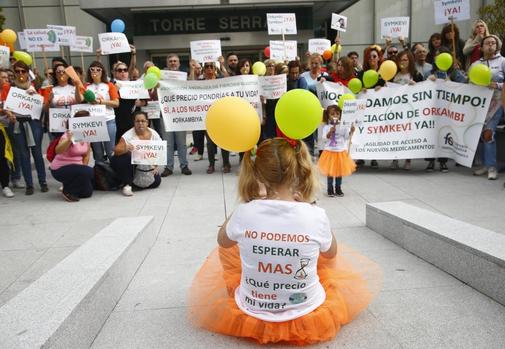- Those affected by cystic fibrosis: "With this drug my child could breathe again"
After years of battle, more than 550 patients with cystic fibrosis in Spain, 113 of them children, will see their treatment funded.
The acting Minister of Health, María Luisa Carcedo, has announced, after meeting with patient organizations, that two medications for the treatment of cystic fibrosis, Orkambi and Symkevi, both of the US pharmaceutical company Vertex, will be included in the pharmaceutical benefit of the National Health System (SNS) from November 1 .
Spain thus becomes the eighteenth country in the world that finances these drugs.
Orkambi is indicated for children between 6 and 12 years old and Symkevi for children over 12 years old and adults. "In this way a continuity in the treatment of this pathology is guaranteed," said Carcedo.
Patient satisfaction is great. According to Blanca Ruiz, president of the Spanish Cystic Fibrosis Federation (FEFQ), “after almost 4 years of waiting for an agreement to be reached, today is a very important day for us and for me the happiest of my presidency. The purpose of the Federation is to encourage people with cystic fibrosis to have a good quality of life and fight for their rights, including having access to the best available treatments. Today one of those goals has been achieved. We only hope that the availability of these treatments in hospitals will be as early as possible ».
And it is that both drugs will be dispensed in the hospital after the diagnosis of cystic fibrosis through a genetic mutation test. For this, a pharmacoclinical protocol has been developed, with the variables to be measured and at what stages of the treatment.
Meanwhile, Cristina Simal, secretary of the FEFQ, speaks from experience: «Access to these medications will mean a qualitative leap in the health of those who can take them. Our joy and that of our families is immense. I know, from my own experience taking Symkevi, that there is a before and after. And I am glad that they finally give us what corresponds to us ».
Three years of struggle
The battle of the patients began, in effect, more than three years ago, when the Spanish Medicines Agency (AEMPS) approved the introduction of these medicines in the Spanish portfolio; in all that time, the Ministry of Health and the company have not been able to reach an economic agreement .
Given the high price of these medicines, finally their inclusion among those financed will be carried out through a mixed model of maximum ceiling of expense and payment for results : «We are facing a drug that generates clinical uncertainty, so the payment is conditioned on the patient respond to treatment, ”explained the minister. Thus, the laboratory will only reimburse your medication if the treatment works.
Cystic fibrosis is a degenerative disease, caused by a genetic mutation, which mainly affects the lungs and digestive system. Patients suffer a decrease in water, sodium and potassium that leads to the obstruction of the channels that carry secretions, which causes their stagnation, infections and inflammations that destroy areas of different organs such as the liver, pancreas, reproductive system and fundamentally the lung. Respiratory function is reduced to the point of requiring a transplant.
Therefore, the financing of these medicines is a good news, although not for everyone: patients susceptible to benefit from these treatments are around 60% of the total, due to the type of mutation they suffer.
However, in November 2018, Vertex announced the positive results of two phase III trials of a triple combination with which 90% of patients could be treated. The problem is that, given the expectations generated, this could become one of the most expensive drugs in the world .
According to the criteria of The Trust Project
Know more- Science and Health
EnvironmentA 1,600 square kilometer iceberg emerges from Antarctica
Interview "It is not alarmist to report on science that is alarming"
Environment Each mobile would require a useful life of at least 25 years to compensate for its impact on the environment

